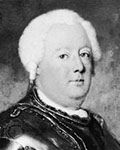Friedrich Wilhlem I.
|
 |
Friedrich Wilhelm was the son of king Friedrich I. of Prussia (1657-1713) by his second wife, Sophie Charlotte (1688-1705), princess of Brunswick - Lüneburg - Calenberg (Hanover). Much of his youth was spent at the court of his grandfather Ernst August (1629-1698), later(1692) first elector of Brunswick - Lüneburg (Hanover). When he returned to Berlin, Friedrich Wilhelm developed a passion for military life. Unlike his father, Friedrich Wilhelm was frugal, had simple tastes, and a hot temper. He was always a protector of the church and religion. He detested religious quarrels and was extremely tolerant of his Catholic subjects, except the Jesuits. His life was simple and puritanical, founded upon Biblical teaching. He disliked the French intensely, and he strongly disapproved of the imitation of their manners by his father and his court.
When he came to throne on 25 February 1713, his first act was to dismiss from the palace every unnecessary official and impose a policy of frugality. Most of the court's beautiful furniture was sold. In internal politics he was a great administrator, and he established policies followed long after his death. His foreign policy was less successful, although he was able to extend his domain to some extent. Unlike his father, he did nothing for higher learning and even banished the philosopher and disciple of Leibniz, Christian Wolff (1679-1754), at forty-eight hours' notice "on pain of the halter," for teaching, as he believed, fatalist doctrines. Later he modified his judgment in favor of Wolf, and in 1739 even recommended the study of his works. He established many village schools, which he often visited in person. After 23 October 1717 all Prussian parents were obliged to send their children to school. His subjects flourished under his rule, and they respected him for his firmness, honesty of purpose, and love of justice. He was devoted to his army, whose numbers he raised from 38,000 to 83,500,making Prussia the third greatest military power in the world, behind Russia and France. The Potsdam guard, comprised of giants collected from all parts of Europe, sometimes kidnapped, was something of a plaything by which Friedrich Wilhelm amused himself. The reviewing of his troops was his chief pleasure, but he was also fond of meeting his friends in the evening in what he called his Tobacco-College, where amid clouds of tobacco smoke he discussed affairs of state and listened to the latest guard-room jokes.
Friedrich Wilhelm died on 31 May 1740, leaving behind his widow, Sophie Dorothea (1687-1757) of Brunswick - Lüneburg - Calenberg (Hanover) (1687-1757), whom he had married on 26 November 1706. Sophie Dorothea was the daughter of Sophie Dorothea (1666-1726) of Brunswick - Lüneburg - Celle and her cousin Georg Ludwig (1660-1727) of Brunswick - Lüneburg - Calenberg (Hanover), later king Georg I. Ludwig of Great Britain (1714). Friedrich Wilhelm's son was Friedrich II. the Great (1712-1786), who was very much his father's opposite. Their relationship became so strained in 1730 that the crown Prince fled the court and was later arrested and brought before a court martial. In later years, father and son were reconciled.
![]()
Sources
- The Encyclopædia Britannica, 13th edition. New York: The Encyclopædia Britannica, Inc., 1926.
Web





